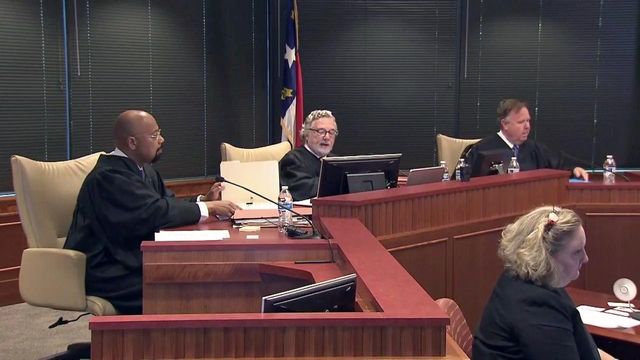Judges dismiss Cooper challenge to elections board overhaul
A three-judge panel ruled Thursday that a law combining oversight of elections and ethics complaints under one board could move forward.
Posted — UpdatedIn a brief order, the judges dismissed Gov. Roy Cooper's challenge to the law without ruling on its constitutionality. They said simply that they lacked jurisdiction over the matter.
"The decision that the court doesn't have jurisdiction to hear this case is completely inconsistent with this panel's own ruling in March," Cooper spokesman Ford Porter said in a statement. "It looks like the threats from the legislature had an effect on these judges, and we believe the higher courts will respond differently in order to protect access to the ballot box for North Carolina voters."
"Today, the three-judge panel swiftly rejected Roy Cooper’s latest attempt to drag his political battles into the courtroom and instead delivered a victory to North Carolina voters, who should now expect their elections and ethics laws to be enforced fairly and with bipartisan cooperation," Senate President Pro Tem Phil Berger and House Speaker Tim Moore said in a joint statement. "We encourage the governor to accept this result and abandon his taxpayer-funded pursuit of total control of the board responsible for regulating his own ethics and campaign finance conduct."
Berger and Moore have previously accused the judges of legislating from the bench and said that their decisions would have "profound consequences."
Cooper filed suit again, arguing the partisan split on the board sets the stage for repeated deadlocks, which still interferes with his ability to carry out elections laws. He also said the new law prevents him from naming a state elections director.
The judges seemed skeptical of that argument on Thursday, however, suggesting the disagreement between Cooper and lawmakers was more a "political question" than a constitutional one.
Superior Court Judge Jesse Caldwell noted that Democratic-controlled legislatures made a series of changes to retain control of the State Board of Elections during the 1970s and 1980s when Republican governors were in office.
"It seems as though you're asking this court to rule on something that hasn't happened yet, and clearly we're not supposed to do that. I have concerns about the speculative nature of the perceived wrong," Superior Court Judge Jeffrey Foster told Cooper's attorney, Jim Phillips.
"This is a classic separation of powers question," Phillips replied. "We're not saying the General Assembly can't combine these boards ... (but) they took from the governor, from the executive branch, the ability to appoint the state officers who will exercise those functions, powers and duties (of the board). Those are two fundamentally different things. The General Assembly gets to determine one; it doesn't get to determine the other."
Noah Huffstetler, an attorney for legislative leaders, said Senate Bill 68 gives Cooper the authority to name and remove members of the elections/ethics board that the judges said was lacking previously, so the constitutionality question has been resolved.
"This is really a partisan political struggle masquerading as a separation of powers case," Huffstetler said. "The real issue here is not a separation of powers challenge but simply a bid to control the elections process in a way that governor has been able to so far."
Related Topics
• Credits
Copyright 2024 by Capitol Broadcasting Company. All rights reserved. This material may not be published, broadcast, rewritten or redistributed.






